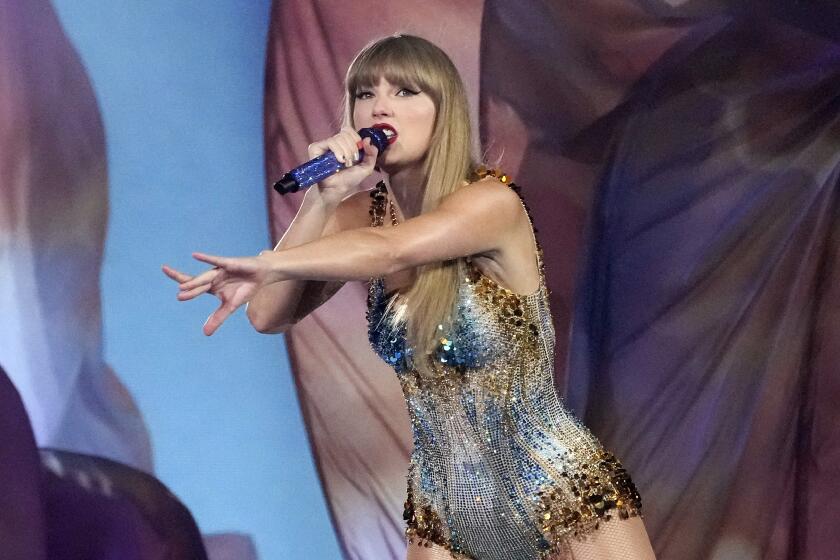JAZZ : He’ll Play ‘Misty’ for You : Kyle Eastwood has spent plenty of time on film sets with dad Clint, but his heart is onstage, with his bass.
The bass player in the quartet at a Studio City club called Legends of Hollywood on a recent Thursday looks so familiar that for a minute you just stare at him, ignoring his big sound and his sharp, precise time--the way he’s right there with the drummer, providing a robust pulse for the saxman and the pianist to wail on top of.
And when the tall, slender young man turns and highlights his profile, pursing his lips slightly to let you know that it’s darn hard to play a tune as fast as that old warhorse “Cherokee”--the long oval face, hazel eyes, slightly arched eyebrows, fair complexion and lazy, wavy hair all tell you his name is Eastwood.
But this is Kyle Eastwood, and though he may look like his famous father, the 26-year-old has decided for the time being to eschew the business that made the family name recognizable around the world and instead focus on the music he loves.
Nonetheless, the film world is an essential aspect of Kyle Eastwood’s life. As a 13-year-old, he co-starred with his father in 1982’s “Honkytonk Man,” the story of an ailing Depression-era singer who is trying to play the Grand Ole Opry before he dies. Through the years, Kyle has done bit parts in his father’s movies, including the upcoming “The Bridges of Madison County,” in which he performs in an on- camera band.
“I still love film,” he says later, plopped comfortably on a couch in the Hollywood Hills home he shares with his companion, Laura Gomez, and their daughter Graylin, 1. “I’ve always been really interested in it, and it’s definitely a big part of me. But now I’m into music more.”
Eastwood’s quartet, featuring Doug Webb on sax, Kendall Kay on drums and Matt McGuire on piano, is a bright, if not completely polished, gem that with a little work could become one of the town’s best. It has been together for about a year and a half and has worked at the Baked Potato North Hollywood, Catalina Bar & Grill, Alice’s Restaurant in Westwood and Legends. The band works Friday at Jax in Glendale and returns to the Baked Potato on May 14.
And while Webb, a superbly fluid soloist, and McGuire, a crisp-lined, Bud Powell-schooled pianist, are certainly the band’s featured soloists, the underlying strength of the unit resides in Eastwood’s strong walking bass lines and Kay’s elastic beat.
Webb, a gifted player who has yet to gain his moment in the spotlight, is one who thinks Eastwood has the goods to really make a splash.
“Kyle’s a great young bass player. If he keeps on going like he’s going, he’ll be one of the top bass players around,” Webb says.
In his self-effacing way, Eastwood takes such compliments courteously while still acknowledging his strengths--and limitations.
“I work on trying to have as good a time as possible, good intonation, have a good sound. It’s all very important,” Eastwood begins, speaking without hurry. “But acoustic bass is not an easy instrument to solo on. A lot of people take it to a whole other level. That’s something I’m working on. I still have a ways to go in a lot of different areas.”
Indeed, in a rhythm section, Eastwood’s supple feel is reminiscent of the great Paul Chambers, who was Miles Davis’ bassist from 1954 to 1962. It’s no surprise, then, that Chambers has been a major influence on Eastwood’s style.
“Paul could play anything. He played great bass lines that weren’t like stock kind of lines. And he was a great soloist and a great bow player,” says Eastwood, whose easy, pleasant demeanor mirrors his father’s off-screen persona.
With his talent and knowledge of jazz, it would seem that Eastwood has been playing most of his life--and he has, starting piano lessons at age 10. But he’s only been a serious musician for about seven years.
He says he began to listen to jazz at an early age. Both his parents--his father and mother, Maggie Johnson, were divorced in the early ‘80s--remain avid jazz fans.
“My earliest memories of music were recordings by Stan Kenton, Dave Brubeck and Miles Davis,” Eastwood says. “Then, later, my parents used to take me to the jazz festival in Monterey and I’d meet people backstage with my dad.”
Kyle Eastwood and his father are obviously close. In the bassist’s home, there’s a table with family pictures. In one, taken on the set of 1971’s “Dirty Harry,” Clint holds a towheaded Kyle upside down by the feet, swinging him in midair. In another, there’s Kyle, his father, Meryl Streep and some musicians, taken on the set of “The Bridges of Madison County.”
He still often goes out and listens to music with his father, as they did a few weeks ago, catching young bass ace Christian McBride at Catalina Bar & Grill in Hollywood. Seeing the two sitting side by side further cements their physical similarity. And given his affinity for music, it’s natural that the elder Eastwood supports his son’s musical aspirations.
“Whatever a person wants to do in life, as long as they want to do it well, they should do that,” Clint Eastwood says. “He’s doing it well, and he seems to enjoy it. Obviously, doing film wasn’t as nagging in his blood as it should have been, at least in the acting part of the profession. To be an actor, you have to be a determined soul. You’ve gotta want to do it more than anything else on the planet, or else there’s really no reason to be doing it. But Kyle loves the music, and he’s doing really well with it. I’m proud of him and glad to see him doing it, following through.”
If the younger Eastwood’s fondness for music was piqued when he was a child, it started to take a real hold on him when he was a teen-ager, enrolled as a student at Robert Louis Stevenson, a private prep school in Pebble Beach. It was there, in the early ‘80s, that he first picked up the bass.
“I had friends who played, and one of them, who was in the school jazz band, kind of got me into trying to play,” he says in a resonant voice that is not quite as deep or as distinctively scratchy as his father’s. “I started with electric bass. Without knowing too much theory, it was easy for me to figure out bass lines. At first I just played rock. Jazz was a little too complex. I played some jazz things but for the most part, no.” He and some of his friends formed a band, but it was pretty low-key. “We played a few dances, that’s all,” says.
During this period, Eastwood listened mainly to ‘60s rock and jazz. “I was never into punk or new wave, what was popular,” he says. His jazz interests remained varied, as he checked out recordings by Davis, Charlie Parker, Chick Corea, the Mahavishnu Orchestra and others.
In 1986, after graduating from high school, the younger Eastwood moved to Los Angeles and studied not music but film--first for a year at USC, then a year and a half at UCLA. But the urge to tackle music was too strong, and he commenced serious studies with Bunny Brunel, who had been an electric bassist with Corea and others.
“He taught me about theory, about getting past something more complex than a three-chord rock tune,” Eastwood says. “After that, I started figuring things out for myself.”
It was Brunel who got Eastwood interested in pursuing acoustic bass, and for a while, in 1988, he practiced up to 10 hours a day.
“I was living with my dad in Sherman Oaks, and it seems like I only left the house to eat,” he says. “I was immersed in it. I was learning how to play at the time. I feel I started fairly late, so I wanted to catch up for time lost.”
These days, a healthy practice session lasts between three and four hours, as there are plenty of parental duties. “Having a kid takes a lot of time, but I don’t regret it,” he says. “I still practice as much as I can.”
In the early ‘90s, Eastwood and some friends formed the West Quintet, a jazz-fusion band that played regularly at the Baked Potato North Hollywood and performed at the Montreux Jazz Festival in Switzerland. In that band he played electric bass, but by 1993, he found himself drawn again to the straight-ahead music of people like Thelonious Monk, Sonny Rollins and Joe Henderson and returned to the sound that was pulling him, the sound of the large, wooden acoustic bass.
“You have to make that sound yourself. It’s more in your hands,” he says, spreading his, which are notable for his extremely long fingers. “It is to some degree with the electric as well, but the acoustic is a lot harder instrument to play. Also, it’s more suited to more traditional jazz, straight ahead, which is the music that I feel the most, that I enjoy listening to the most. It’s what I’m into.”
Eastwood started a quartet to play his kind of music: originals (by both McGuire and himself), jazz staples (Miles Davis’ “No Blues” and “Solar,” Coltrane’s “Straight Street,” Ellington’s “In a Sentimental Mood”) and standards (David Raksin’s “Laura,” Antonio Carlos Jobim’s “Dindi”).
He hopes to record the band and has been making demo tapes to shop around. But more important than success with his quartet, he seeks personal fulfillment.
“I’d like to be as good as I possibly can,” he says matter-of-factly. “I’d like to be able to do everything: film scoring, playing on scores, get called from anybody and feel confident that I could handle it. Just keep on working with everything within music.”
Does he think he’ll at some point focus on film? Maybe--but not to the exclusion of music.
“I don’t think I’ll ever move completely away from music,” he says. “I love it too much.”
* Kyle Eastwood Quartet, Jax, 339 N. Brand Blvd., Glendale; Friday, 9 p.m.; (818) 500-1604. Also at the Baked Potato North Hollywood, 3787 Cahuenga Blvd.; May 14, 9:30 and 11:30 p.m.; (818) 980-1615.
More to Read
The biggest entertainment stories
Get our big stories about Hollywood, film, television, music, arts, culture and more right in your inbox as soon as they publish.
You may occasionally receive promotional content from the Los Angeles Times.










